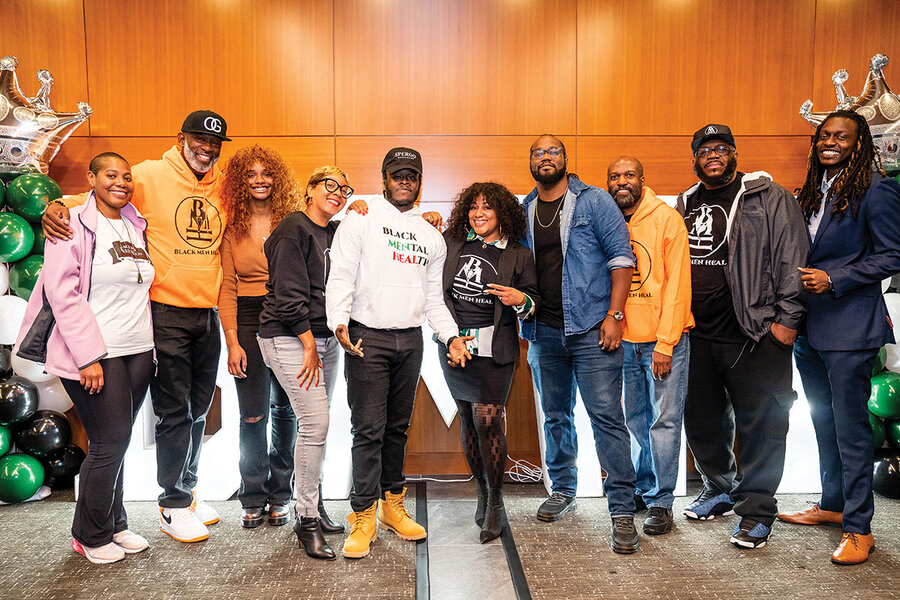‘A breath of fresh air’: How one group offers Black men a path to healing
Loading...
| Philadelphia
Broaching the subject of mental health was once taboo in certain communities. Not anymore. For Black men specifically, this couldn’t be more true.
Billionaire hip-hop mogul Jay-Z espouses the importance of therapy in a Netflix interview with former talk show host David Letterman. Charlamagne Tha God, a host of the nationally syndicated radio show “The Breakfast Club,” is a strong proponent of mental health awareness and destigmatizing it in Black communities. He often shares his personal battles with anxiety.
When comedian Marlon Wayans served as the guest host for Comedy Central’s “The Daily Show” this spring, he implored guests and viewers to donate to a Philadelphia area nonprofit that specializes in introducing Black men to therapy.
Why We Wrote This
A story focused onStigma and lack of affordability around mental health in vulnerable communities can hinder progress. A Philadelphia-area nonprofit seeks to help one segment of the population heal.
Black Men Heal is a 5-year-old organization that has been increasingly part of the conversation about Black men and mental health, specifically in a time of upheaval in America. The group, which also curates programming for people of color, is the brainchild of founder Tasnim Sulaiman, a licensed therapist who ran her own private practice before she started Black Men Heal.
“I had clients – Black men – who all started coming to me with some of the same problems, and I started to see a pattern,” Ms. Sulaiman says.
During her private sessions with clients, recurring problems kept manifesting: unresolved childhood trauma, absentee fathers missing from their lives, and frustration from having to traverse a larger world full of societal ills. She helped many of her clients resolve marital, professional, and personal problems. But she was only one person, and every Black man in Philadelphia didn’t have the same income as the men who sat down across from her.
“I started to wonder how many other Black men were feeling like this but weren’t going to therapy. My clients were well-to-do men who could afford to pay $150 [per visit] or they had jobs with good insurance,” she says.
Pro bono therapy
A picture of how she envisioned Black Men Heal came to her one day while out jogging, and she got to work. She had already started doing pro bono work for some financially strapped individuals, but she saw that the number of Black men in need was much higher. Her goal was to offer multiple free sessions and pair the men with culturally sensitive therapists, perhaps Black men, who could build rapport with them and establish trust. She had a daughter to raise and bills of her own as a newly divorced woman, so she couldn’t offer all of her services for free. But she could gather a community of like-minded people to address the issue, she thought.
“I knew other people who were therapists. I told them what I was trying to do but that I couldn’t pay them,” Ms. Sulaiman says. “Since I like to cook, I told them that I could cook for them,” she says during a Zoom call, pointing from her kitchen to the dining room table of her home.
They bought into her idea and started to offer pro bono therapy. Black men also bought into the idea. Today Black Men Heal offers eight free sessions to new participants and seeks to destigmatize therapy and eliminate costs. If participants wish to continue therapy, they can if their insurance covers it or if they can afford it out of pocket.
Black Men Heal has a 75% continuation rate among participants. It hosts virtual Sunday sessions called Kings Corner, where Black men from across the country gather on Zoom to talk about healing. In five years, Black Men Heal has served 3,567 men, between individual therapy and Kings Corner sessions, with 1,642 new individuals participating in 2022. Since starting in 2018, the organization has expanded its list of providers beyond Pennsylvania to Delaware, New Jersey, Illinois, Maryland, the District of Columbia, New York, Virginia, and Georgia.
In the Philadelphia area, Black Men Heal has inspired local organizations and has been recognized for its community work. Film director Muhammad Bilal credited his time in counseling through Black Men Heal with helping him work through personal issues. He went further and created a 48-minute film, “Perdido,” about mental health. He premiered the film and participated in a panel discussion about it, led by Ms. Sulaiman, at a Community Mental Health Awareness Day in West Philadelphia in early May.
Chapter leaders at African American Greek Fraternity, Phi Beta Sigma, Pi Gamma Sigma Alumni Chapter, wanted to shine a light on the work that Ms. Sulaiman was doing. They named Black Men Heal the nonprofit business of the year in 2019 at their Bigger and Better Business ceremony. They also are debuting a new initiative this year, My Brother’s Keeper, where they want to send alumni fraternity members – no questions asked – to the organization for counseling for mental health wellness.
“As Black men, or men in general, we keep quiet about stuff when we shouldn’t, and for her to tackle that, that was big. There’s a lot going on in the world today,” says William Streeter, who chaired the board that nominated Black Men Heal for the award. “She’s definitely making a difference and it’s slowly growing, because we’ve been watching for a while. We figured we could help support her by sending a few people her way.”
“Like a breath of fresh air”
Participation in Black Men Heal grew tremendously during the pandemic. Ms. Sulaiman says the ability to offer counseling sessions virtually, which is how the sessions are done now, helped more men connect with the organization.
LeBrian Brown was a pandemic convert to Black Men Heal, after a series of setbacks almost drove him to his breaking point. “We had just lost a baby,” he says. “My wife got laid off from work. It was during COVID. I was just depressed, man.”
He was crushed after seeing George Floyd’s murder online and participated in multiple protests, he says. His family went from two incomes to surviving on the $40,000 he made working at a Philadelphia nonprofit that serviced unhoused people.
“I just felt like I couldn’t continue on,” he adds.
His wife heard about Black Men Heal through a friend and suggested that he apply for a lottery they had to accept new patients. He and several of his friends wrote to the organization for free therapy and he heard back within days.
“When I came into Black Men Heal, it was like a breath of fresh air,” Mr. Brown says. “The therapist took me all the way back to problems with my dad, and problems with my hometown [Trenton, New Jersey], and just problems with me not believing in myself, all the way to the point where I am now. And it just freed me from a lot of those demons,” Mr. Brown says.
His therapist gave him homework, having him write letters to people and address his trauma. He stopped therapy after his 12 free sessions because he said that he wanted to test to see if he was strong enough to incorporate what he’d learned into his daily life.
Since therapy ended, he started his own consulting business that helps those who are formerly incarcerated integrate back into society. He secured a contract with the state of Pennsylvania to provide those services. His wife is pregnant again with their first child together. Once his new health insurance kicks in, he’s going back to therapy, he says.
“Black Men Heal gave me a lot of confidence,” he says, adding that his life “changed for the better.”








